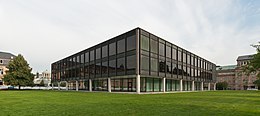Landtag of Baden-Württemberg
This article needs to be updated. (March 2021) |
Landtag of Baden-Württemberg Landtag von Baden-Württemberg | |
|---|---|
| 17th Landtag of Baden-Württemberg | |
 | |
 | |
| Type | |
| Type | |
| Established | 1952 |
| Leadership | |
President of the Landtag | |
Vice President | |
| Structure | |
| Seats | 154 |
 | |
Political groups | Government (100)
Opposition (54) |
| Elections | |
Last election | 14 March 2021 |
Next election | 2026 |
| Meeting place | |
 | |
| Stuttgart | |
The Landtag of Baden-Württemberg is the diet of the German state of Baden-Württemberg. It convenes in Stuttgart and currently consists of 154 members of five political parties. The majority before the 2021 election was a coalition of the Alliance 90/The Greens and the Christian Democratic Union (CDU), supporting the cabinet of Green Minister-President Winfried Kretschmann.
Current Composition
After the elections of 14 March 2021, the composition of the Landtag is as follows:
| Party | Seats |
|---|---|
| Alliance 90/The Greens | 58 |
| Christian Democratic Union (CDU) | 42 |
| Social Democratic Party (SPD) | 19 |
| Free Democratic Party (FDP/DVP)[1] | 18 |
| Alternative for Germany (AfD) | 17 |

Elections are conducted using a mixed-member proportional representation system, with a minimum of 5% vote share to receive any seats. However, there are some exceptions, making the Baden-Württemberg election system one of the most complicated in Germany.[2]
The minimum size of the Landtag is 120 members, of which 70 members are elected in single-member constituencies with first-past-the-post voting, and 50 are elected by proportional representation. Overhang and levelling seats may be added.

The main difference in their electoral system compared to the federal Bundestag is that there are no list members, making all members local. Proportionality is maintained by parties awarding remaining seats to candidates within a party who didn't win a geographic district (a Zweitmandat, or "second mandate") ordered by most to least popular (e.g. a candidate losing with 47% of the vote would be placed ahead of a candidate losing with 20% of votes in their district).

This does mean that a candidate who placed second within their district isn't guaranteed a seat, if other losers in their party were more popular and if their party only needs a small number of seats to maintain proportionality.
Historical Composition
-
1st Landtag, following 1952 election
-
2nd Landtag, following 1958 election.
-
3rd Landtag, following 1960 election
-
4th Landtag, following 1964 election
-
5th Landtag, following 1968 election
-
6th Landtag, following 1972 election
-
7th Landtag, following 1976 election
-
8th Landtag, following 1980 election
-
9th Landtag, following 1984 election
-
10th Landtag, following 1988 election
-
11th Landtag, following 1992 election
-
12th Landtag, following 1996 election
-
13th Landtag, following 2001 election
-
14th Landtag, following 2006 election
-
15th Landtag, following 2011 election
-
16th Landtag, following 2016 election
-
17th Landtag, following 2021 election
Presidents of the Landtag
So far, the presidents of the Landtag of Baden-Württemberg have been:
- 1952–1960 Carl Neinhaus, Christian Democratic Union (CDU)
- 1960–1968 Franz Gurk, CDU
- 1968–1976 Camill Wurz, CDU
- 1976–1980 Erich Ganzenmüller, CDU
- 1980–1982 Lothar Gaa, CDU
- 1982–1992 Erich Schneider, CDU
- 1992–1996 Fritz Hopmeier, CDU
- 1996–2011 Peter Straub, CDU
- 2011 Willi Stächele, CDU
- 2011–2015 Guido Wolf, CDU
- 2015-2016 Wilfried Klenk, CDU
- 2016–present Muhterem Aras, Alliance 90/The Greens[3]
See also
- 2021 Baden-Württemberg state election
- 2026 Baden-Württemberg state election
- Baden Landtag elections in the Weimar Republic (1919–1929)
- Württemberg Landtag elections in the Weimar Republic (1919–1932)
References
- ^ In Baden-Württemberg the FDP faction in the Landtag is called FDP/DVP for historical reasons [1]
- ^ Neumann, Edgar (16 August 2007). "Landtagspräsident will vier Wahlkreise gestrichen werden" [Parliament President wants four districts eliminated]. Pforzheimer Zeitung (in German). Archived from the original on 27 September 2007. Retrieved 31 May 2008.
- ^ Dearden, Lizzie (12 May 2016). "First Muslim woman elected as speaker in German state parliament". The Independent. London.

















